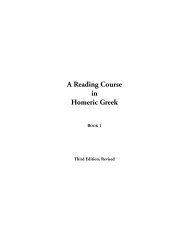Roman Sports and Spectacles - Focus Publishing
Roman Sports and Spectacles - Focus Publishing
Roman Sports and Spectacles - Focus Publishing
You also want an ePaper? Increase the reach of your titles
YUMPU automatically turns print PDFs into web optimized ePapers that Google loves.
Introduction<br />
· vii<br />
Every culture has its own forms of entertainment. In Rome the favorite<br />
entertainments were the great public games, called ludi, 1 <strong>and</strong> the similar<br />
spectacles originally put on for funerals of important people, called munera. 2<br />
These performances might include plays, combat sports, or chariot races. The<br />
types of entertainment the <strong>Roman</strong>s favored <strong>and</strong> the way they organized <strong>and</strong><br />
funded their spectacles can tell us a great deal about <strong>Roman</strong> life.<br />
This book sets out some of the most important textual sources for <strong>Roman</strong><br />
sports <strong>and</strong> spectacles, so that readers may explore for themselves how the<br />
<strong>Roman</strong>s entertained each other <strong>and</strong> what they thought of their spectacles.<br />
I have assumed no knowledge of <strong>Roman</strong> history or the Latin language.<br />
Key terms not only from sports but from <strong>Roman</strong> politics <strong>and</strong> culture are<br />
explained in a glossary <strong>and</strong> defined briefly in footnotes when they first<br />
appear; the most important have been left in Latin <strong>and</strong> appear in italics. In<br />
this introduction, I provide an overview of the subject <strong>and</strong> some historical<br />
background to help with the details of the selections.<br />
Why do we study ancient sports? <strong>Sports</strong> <strong>and</strong> spectacles are the main<br />
components of the popular culture of a society that ruled most of the<br />
known world for hundreds of years: the <strong>Roman</strong>s. Studying <strong>Roman</strong> sports<br />
<strong>and</strong>, especially, <strong>Roman</strong>s’ ideas about their sports gives us insight into how<br />
their society worked. Moreover, many of the issues that mattered to the<br />
<strong>Roman</strong>s are still important to us today:<br />
· Does watching violent entertainment harm or corrupt the spectator?<br />
· Are athletes good role models? Does participation in sports build<br />
character?<br />
· Is watching sports a good use of time for an educated or upperclass<br />
person? Or are sports <strong>and</strong> spectacles only for the lower<br />
classes?<br />
· Should public funds be used to build sports arenas <strong>and</strong> theaters,<br />
or to pay for competitions?<br />
· Who holds the record? Who won the most prize money? Who’s<br />
the best?<br />
1 Ludi (sg. ludus) are public spectacles, including games <strong>and</strong> theater performances. See the<br />
glossary for more information.<br />
2 A munus (pl. munera) is a duty or office; the word comes to mean a gladiator show.<br />
vii















